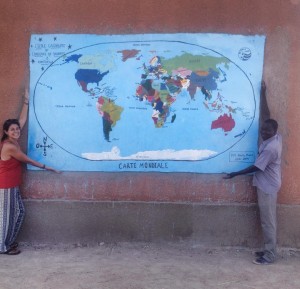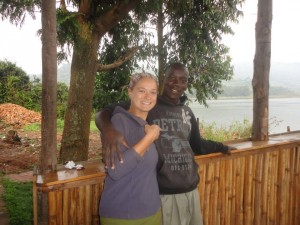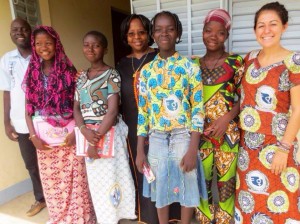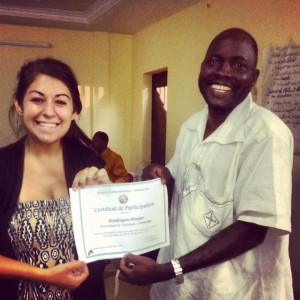by Molly Hanson
Written into the University of Wisconsin-Madison’s mission is that university should act to expand its research, curriculum and ideas to improve upon the world outside of the boundaries of academia. One way in which the idolized Wisconsin Idea has historically manifested itself has been through the university’s long held legacy as a top Peace Corps volunteer producing school. This tradition has continued as this year UW-Madison once again has boasted some of the highest volunteer numbers in the nation.

Source: Natalie Moore
After taking the top spot on the Peace Corps’ 2014 list of top volunteer producing schools , UW-Madison slipped to number two in the 2015 list . With 69 alumni serving in the Peace Corps this year, UW-Madison was just three volunteers behind the University of Washington, which topped the Peace Corps’ list with 72 volunteers.
UW-Madison has held the top status among Big Ten schools for number of alumni peacefully serving around the globe since 2012. The next Big Ten school to have made this year’s list was number four-ranked Ohio State, which has 64 alumni currently serving.
Eric Luckey, UW-Madison’s Peace Corps recruiter, believes that the Wisconsin Idea that has been embedded into the university has contributed to its leadership in producing volunteers for the Peace Corps.
“The centrality of the Wisconsin Idea here at UW-Madison, that what happens at UW-Madison university extends to the boarders of the state and ultimately to the world, resonates with a lot of people,” said Luckey. “There’s a great culture of service at UW-Madison. I think a lot of people come here not just because they want to learn how to enter into the workforce, but because they want to learn a set of skills and learn more about the world in which they live in order to make a positive difference.”
In addition to leading the Big Ten in recent years, UW-Madison has been a historical national leader in the number of Peace Corps volunteers it has produced. Since the Peace Corps’s foundation in 1969, UW-Madison has produced a total of 3,145 volunteers. That sets UW-Madison just behind the University of California-Berkley in total number of volunteers produced.
Luckey believes that the university’s identity that brings students about the type of student to UW-Madison who would like to join the Peace Corps is self-perpetuated by the historically high recruitment rankings UW-Madison boasts.
“We start sending a lot of people into service and then what happens is the city itself starts to take on a pretty particular identity. Campus itself takes on a pretty particular identity that molds and brings people in who would be Peace Corps volunteers,” said Luckey.
The integration of UW-Madison’s campus into the city of Madison may have helped to both attract world-minded students and inspire an interest in the rest of the world in students.
Andrea Vogel, a returned Peace Corps volunteer who attended school at Grand Valley State University in Michigan, now lives in Madison where she believes citizens are more concerned with worldly affairs.

Source: Andrea Vogel
“For some reason people here seem to be very open minded,” Vogel said, who compared Madison’s attitude to that of her own university’s. “They have much more world knowledge than what I remember being surrounded by with people in Michigan. I think you can bump into people here and they’re much more knowledgeable about things going on in the world, with different cultures, and their much more determined to change things that aren’t right in the world.”
Luckey also theorized that the geography of the city of Madison is compatible with the ideals of the Peace Corps.
“I think that there’s something about water and having the lakes right here on campus that creates a different relationship between the campus and the world,” Luckey said. “We’re within the city, close to downtown. There’s that energy from the Capitol that, I think, itself helps make the identity of UW-Madison feel as though you’re situated next to the government. Also the natural environment [creates] this connection with the rest of the city that I think changes that people think about what the identity of the university is.”
Kera Halverson, the regional Peace Corps recruiter, believes that the international focus of UW-Madison has been prime reason in its high-ranking status as a top volunteer producing school.
“Students that typically choose to go to UW-Madison want to create a difference overseas, they want to create a difference not only locally but globally and that’s what the Peace Corps is about,” Halverson said.
It takes more than just an international interest to join the Peace Corps, however.
Halverson believes that the university’s professors and curriculum inspire students to want to create a difference in the world, and prepare them for a global career.
“You could have a million people from Madison apply, but if they don’t have the skills and experience that we’re looking for [they won’t be accepted],” Halverson said. “UW-Madison students have great applications, they interview well and they get the positions. I think UW has it all. In the mission statement and also in the curriculum that can prepare people for international careers.”

Source: Natalie Moore
Peace Corps volunteers are assigned a country where they live for two-and-a-half years and work with the local community to make a positive difference. Volunteers may work in areas of education, health, environment and agriculture, youth development or community economic development.
Although many Peace Corps members initially leave with high hopes to “save the world,” Luckey said that for many volunteers the most valuable part of their experience become the relationships that were built in the community they were assigned to, and an expanded world view.
“I think a lot of people leave with the idea that they’re going to go and they’re going to make some big change in the world,” Luckey said, who joined in the Peace Corps in 2010. “Then they get to a place and they realize how much they have to learn, and then really come to value the relationships that they have during their service and how that changes them and how that creates change in the lives of the people that they spend two years of their lives with.”
The Peace Corps recruitment offices do not keep tabs on whether returned volunteers ever go back to the places in which they served. While Luckey would like to believe that many returned Peace Corps volunteers go on to better the world after their return, he looks at it realistically.
“I’m sure some of them don’t. People come back to their old lives sometimes and I think that’s also fine,” said Luckey. “I’d say all of them have a more nuanced international, cosmopolitan world citizen identity.”
Luckey spent his time in the Peace Corps teaching English in Mongolia where he felt that the expanded work perspective he gained was something he has been able to transfer to friends and family since returning.

Source: Natalie Moore
“My family and friends had the opportunity to learn a lot about Mongolia and to at least have the opportunity to think about a lot of the things that I got to experience from afar,” Luckey said. “I feel really blessed to have the opportunity to share with folks about what I think is a really wonderful, unique place and the people who live there and their language.”
With the recent proposed budget cuts to UW-Madison under Gov. Scott Walker, there has been concern over a possible reshaping of UW-Madison’s mission which would focus upon preparing students for the workforce rather than expanding global impact.
Luckey linked the current refocus in the Wisconsin Idea to concerns over the possible shifting in values away from what the Peace Corps has traditionally stood for.
“Part of the budget cuts were part of this change to the Wisconsin Idea,” Luckey said. “What it means for [UW] to be valuable is to be valuable economically and what we lose out on in the process is of course the notion that there is more than just this economic benefit in the university and I think that as that becomes more and more of a focus of the university, the culture that has driven people to the Peace Corps, can be forgotten and swept under the rug.
“People are going to continue to go to the Peace Corps and it’s a resilient university, but it’s scary to think about sort of a change in the way that we think about what makes this university valuable,” said Luckey.
Click the photo below for more information on the Peace Corps at UW-Madison:
For more on this topic, click here.

